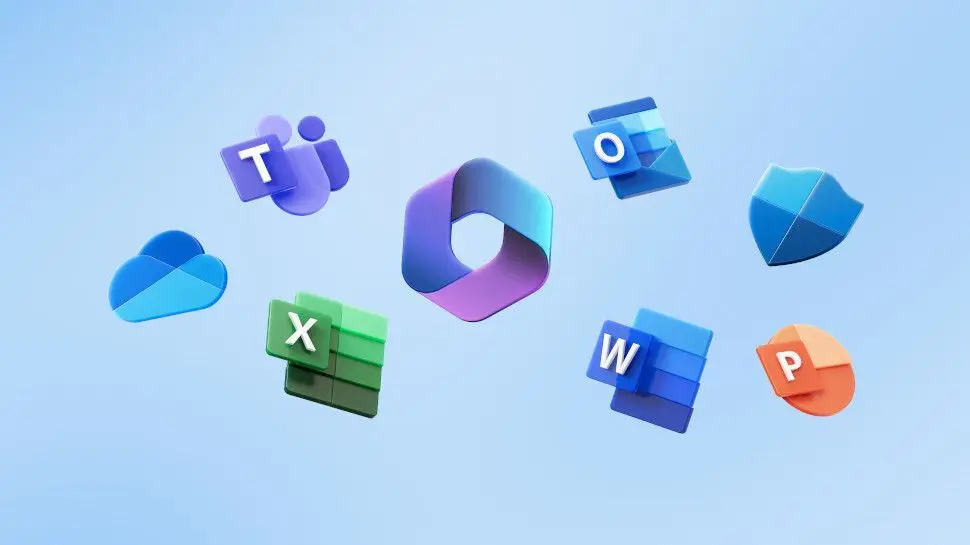Microsoft's Controversial Rebrand: Office Suite Becomes "Microsoft 365 Copilot"
2 Sources
2 Sources
[1]
Microsoft just renamed Office on everyone's PCs, and the new name isn't great
Summary Microsoft rebrands from "Microsoft 365 Office" to "Microsoft 365 Copilot." The change includes a logo switch from a blue hexagon to a Copilot logo with an "M365" tag. Microsoft is focusing on the AI initiative, integrating Copilot into the base plan. Back in December, Microsoft gave out a small warning. It stated that it planned to rebrand its entire productivity line from "Microsoft 365 Office" to "Microsoft 365 Copilot," and people didn't really gel with the idea. Well, seems Microsoft didn't really care, as it has given the green light to begin rebranding everyone's apps to a more Copilot-focused brand. Related Pulsar XBOARD QS Mechanical Keyboard review: A content creator's dream Pulsar created a no-compromises keyboard for streamers and productivity-minded gamers Posts Microsoft 365 Office is now Microsoft 365 Copilot As spotted by Windows Latest, your Office apps are now going to look a lot more Copilot-y in the coming days. This includes changing the Microsoft 365 Office logo from the blue hexagon to the Copilot logo with a small "M365" tag at the bottom right. Long-time fans of Microsoft will know that Office has gone through a few name changes already, so why is it going through yet another one? Well, it's no secret that Microsoft is going all-in on its AI initiative. In fact, Microsoft 365 users recently learned that the subscription price is going up for the first time in 13 years, purely because Microsoft is adding Copilot integration into the base plan instead of relying on people subscribing to Copilot Pro. There's a very high chance that we're only just scratching the surface with this rebrand. After all, given how the company changed the logo to match Copilot's, there's a good chance it will want people to use the suite as a Copilot-powered app first and a productivity app second. The question is, will the people warm up to the idea of Office putting the AI tools ahead of basic functionality? We can't say for sure right now, but we can say that if it doesn't pan out, Microsoft will have a lot of re-rebranding to do.
[2]
The new Microsoft Office logo could be the most confusing rebrand of the year (yes, already)
It's often a sign of a misguided rebrand when people continue to use a brand's old name (Elon Musk might want to take note for X). Microsoft's suite of office apps is a prime example. For many, it will always have the utilitarian, easily comprehensible name of Microsoft Office, despite the tech giant's strange insistence on trying to change that. In 2022, Microsoft Office became Microsoft 365 in a rebranding that did little more than confuse users. In recognition of the power of the name it was trying to kill, even Microsoft continued to call the package 'Microsoft 365 (Office)' in the Apple App Store and Android Play Store until a couple of days ago. But now the iconic 'Office' name has been dropped completely as Microsoft 365 becomes Microsoft Copilot 365. And to make things even more confusing, the office suite now has the same logo as Microsoft's AI chatbot. Ostensibly, the rebrand is intended to highlight the addition of Copilot AI integration into well-known Microsoft Office apps like Word and Excel. But said integration isn't exactly anything to shout about yet. So far, much of the feedback from users involves complaints about the price hike and people wanting to know how to turn off an AI assistant they see as a glorified resurrection of Clippy (perhaps we underestimated the AI potential of Microsoft's anthropomorphic paperclip). As for the logo, the icon for Microsoft Copilot 356 (formerly the Microsoft 365 (Office) app) is differentiated from the existing Copilot icon only by the addition of a 'M365' label. That makes it easy to open the AI bot by mistake when you want to use an Office app. Microsoft could have learned from the reaction to the array of similar-looking Google logos that users like icons to be distinguishable from each other to help them find the app they're looking for. "You made a nice logo for Microsoft 365 and got everything looking nice only to confuse people with another pointless rebrand that uses the same name for every product," one user complained on Twitter- I mean X - on Friday. The move follows the rebranding of Microsoft's Surface line of tablets and laptops as Copilot+ PCs last year. That was a bizarre decision in itself, akin to releasing a computer in 1983 and calling it a 'Microsoft Word PC'. Only that Microsoft Word was a fully functioning product when it was released on the world; Copilot is very much a work in progress. I don't believe that Microsoft can truly think that its AI chatbot is so appealing that people will run out to buy a new PC or download a software package on the back of its name. It seems more likely that the company is thinking the other way around, adding the Copilot name to everything in an attempt to get people to notice and care about a product that so far doesn't do much that Chat GPT can't do. There's a risk to this. As Jez Cordon points out over at Windows Central there's a danger that the entire Microsoft ecosystem, including the more solid products, could become tarnished if people deem Copilot to be a useless gimmick. The new name for Microsoft Office follows a string of strange and confusing naming decisions from Microsoft. After the tongue-twisting Xbox Series X, the company more recently renamed Microsoft Remote Desktop as Windows App. Meanwhile, its web portal has reverted to MSN after the spectacular failure of the rebrand to Microsoft Start. Perhaps it should start asking its AI Copilot for ideas.
Share
Share
Copy Link
Microsoft has rebranded its iconic Office suite to "Microsoft 365 Copilot," emphasizing AI integration but causing confusion and criticism among users.

Microsoft's Bold Rebranding Move
Microsoft has taken a significant step in its AI-focused strategy by rebranding its widely-used Office suite to "Microsoft 365 Copilot." This change, which was initially announced in December, has now been implemented across users' PCs, marking a shift from the familiar "Microsoft 365 Office" branding
1
.Visual Identity Overhaul
The rebranding extends beyond just the name. Microsoft has replaced the iconic blue hexagon logo with the Copilot logo, featuring a small "M365" tag at the bottom right. This visual change aligns with Microsoft's broader strategy to emphasize its AI capabilities across its product line
1
.AI Integration and Pricing Strategy
Microsoft's rebranding effort coincides with the integration of Copilot AI features into the base plan of Microsoft 365. This move has led to the first price increase for the subscription in 13 years, reflecting the company's commitment to positioning AI as a central component of its productivity suite
1
.User Confusion and Criticism
The rebranding has not been without controversy. Many users find the new name confusing and unnecessary, with some continuing to refer to the suite by its original "Microsoft Office" name. The similarity between the new Microsoft 365 Copilot logo and the existing Copilot AI chatbot icon has also been criticized for potentially causing user error
2
.Broader Rebranding Strategy
This change is part of a larger rebranding effort by Microsoft. The company has also renamed its Surface line of tablets and laptops as "Copilot+ PCs," further emphasizing its AI-centric approach. However, some industry observers question the wisdom of tying established product lines so closely to a still-developing AI technology
2
.Related Stories
Potential Risks and Implications
There are concerns that this aggressive rebranding could backfire if users perceive Copilot as a gimmick rather than a valuable addition. Some critics argue that the AI features currently offered by Copilot do not significantly differentiate it from other AI chatbots like ChatGPT
2
.Microsoft's Track Record with Naming
This rebranding follows a series of controversial naming decisions by Microsoft, including the Xbox Series X and the short-lived Microsoft Start web portal. These choices have often led to confusion among consumers and have not always been well-received
2
.As Microsoft continues to push its AI-first strategy, the success of this rebranding effort will likely depend on the actual value that Copilot brings to users of the Office suite. The company faces the challenge of justifying this significant change to its long-standing and widely recognized brand.
References
Summarized by
Navi
Related Stories
Recent Highlights
1
Google Gemini 3.1 Pro doubles reasoning score, beats rivals in key AI benchmarks
Technology

2
Meta strikes up to $100 billion AI chips deal with AMD, could acquire 10% stake in chipmaker
Technology

3
Pentagon threatens Anthropic with supply chain risk label over AI safeguards for military use
Policy and Regulation








